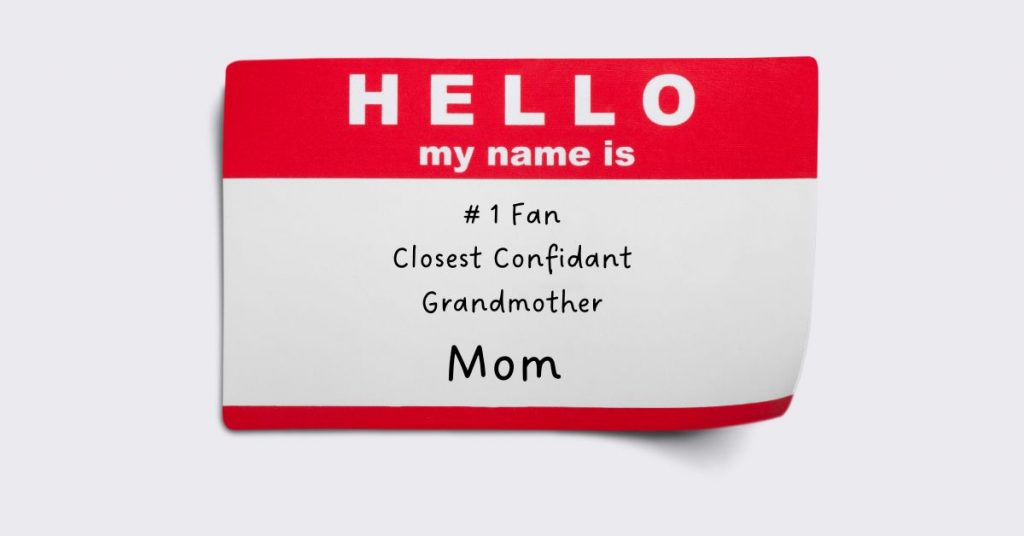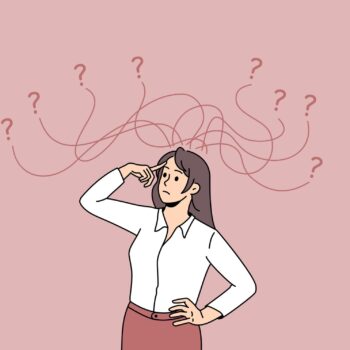Disenfranchised Grieving: Why you can't judge grief by a title
/ Understanding Grief : Eleanor Haley
I want to petition the internet, nay, the world, to stop defining, measuring, or comparing people's grief based on title or primary role. Our titles - i.e., wife, boyfriend, mother, grandfather, friend - can mean so much when we get them. But ultimately, they cannot describe a relationship's complexities and layers, and therefore cannot convey the nature of someone's grief. And sadly, when people assume the depths of a person's grief based on title alone, it often leads to disenfranchised grieving.
I don't mean to diminish the importance of people's roles and identities. On the contrary, these things matter a lot to the people who hold them. And when a person fears they've lost a role integral to their identity, it can turn their world upside down. I get that. But, a title alone can no more describe a relationship than your name can fully illustrate the unique person you are.
We talk about "secondary losses," which are losses that result from a primary loss. And we have the term "cumulative loss," which describes when someone grieves multiple losses simultaneously. But we don't to describe how losing one person can feel like losing 50 because of the many spaces they inhabited in your life.
Think about it; I'll bet very few of your close loved ones fill just one role for you (or you for them), for example:
A spouse who is also a best friend and co-parent.
A parent who is also your #1 fan and the person most likely to bail you out of jam.
An aunt who is also your primary caregiver and your most unconditionally loving family member.
Assuming You Know Someone's Grief Leads to Disenfranchised Grieving
What a title implies is entirely subjective, depending on individual relationships, experiences, and backgrounds. For example, to me, 'grandfather' was someone distant who we visited a handful of times a year. My understanding of 'grandfather' is utterly different than that of my nieces and nephews, whom my father has lived with since birth and has played an active role in their day-to-day lives.
And many people feel they have a relationship that defies conventional labels. For example, someone could be in a relationship with a partner for 20 years but never marry. Theoretically, that relationship is just as deep and interconnected as any. However, in the absence of a marriage license, many people feel their grief is minimized or denied. As a result, they may experience disenfranchised grieving.
For more about Disenfranchised Grieving, read our article Understanding Disenfranchised Grief.
Some people may even self-stigmatize their grief and internalize feelings of being undeserving. Sensing their grief won't be validated, they may deny themselves the right to express their sorrow or receive support for it. If you are struggling with the grief of someone who was many things to you, or if you feel people are judging your grief on face value, read below for a few tips.

If you're grieving someone who was many things to you:
Find opportunities to validate to yourself the many things your loved one was, and is, to you. For example:
- Journal about the spaces they occupied in your life.
- Make a list of the many roles they played (mother, cheerleader, safe haven, most-trusted advice giver).
- Talk to others about how important they were to you.
- Recognize the role(s) they continue to have in your life.
If you're feeling vulnerable to stigma and disenfranchised grieving:
Two: If you are feeling vulnerable to stigma, self-stigma, and disenfranchised grieving, remind yourself of the following. If it helps--say it out loud, write it down on a post-it, or say it to yourself in the mirror.
- You are entitled to your grief-related feelings. You do not need anyone's else's validation or approval. Your feelings are valid because you feel them.
- Feelings are neither good or bad, right or wrong, they just are. If they exist, they exist.
- You are just as deserving of peace of mind and well-being as anyone else, and so it's just as necessary for your to find ways to cope with your grief as anyone else. Pretending your grief doesn't exist won't make it go away.
- You are deserving of compassion and grief support. If someone else minimizes your grief and your need for support, you can either choose to tell them or choose to ignore them. But choosing to believe them is not a useful option.
If you're supporting someone who's grieving:
- Try and enter interactions with your grieving friend or family member with an open mind. Throw out any preconceived notions about X relationship causing Y amount of grief. Grief does not work this way.
- If you're going to assume anything, assume the person is grieving profoundly and needs support. Let the person tell you if this isn't the case, not the other way around.
- If you have a relationship where it would be appropriate to ask questions, ask them about their relationship with their loved one. Asking questions allows the grieving person to talk about the many things their loved one may have been to them, which can be a validating experience. It also helps you to be a more supportive person.

We invite you to share your experiences, questions, and resource suggestions with the WYG community in the discussion section below.
We wrote a book!
After writing online articles for What’s Your Grief
for over a decade, we finally wrote a tangible,
real-life book!
What’s Your Grief? Lists to Help you Through Any Loss is for people experiencing any type of loss. This book discusses some of the most common grief experiences and breaks down psychological concepts to help you understand your thoughts and emotions. It also shares useful coping tools, and helps the reader reflect on their unique relationship with grief and loss.
You can find What’s Your Grief? Lists to Help you Through Any Loss wherever you buy books:






Donald Owens September 3, 2022 at 9:06 pm
She was my second wife, 49 years married, 51 years acquainted. I am not religious and am not sure what is meant by being spiritual. We had a very nice marriage, she had four daughters from her first marriage, I fell for the daughters when I first meant them, they ranged from 5 to 12, a couple of years later we had a daughter together , it was a very happy marriage. She has been gone 1 year now, the grief rolls over me a lot. The last three years of her life she had serious dementia, this seems to me she was gone during that time, I had many frustrating days knowing that she wouldn’t live much longer, watching a love one go is no fun. She was cremated and we all have reminders around. Not having someone around to share your thoughts leaves me very lonely, I do live with a daughter and son in law and part of her family but they are all busy. I’ve most always been somewhat of a loner but being by myself pretty much effects me all of the time. We do have a house keeper and she is an angel but doesn’t speak english very well. One of my frustrations is not knowing what to say about my status when with people.
Jennifer July 5, 2022 at 10:51 pm
I am approaching the nine year anniversary of when I lost the love of my life. I was in my 30s, a time in my life when things were good and I was so happy. The death was sudden and turned my entire world upside down. We were together for seven years. He was my life partner and my everything. But because we weren’t technically married, somehow that doesn’t make me a widow. I am a widow. To say that my boyfriend died doesn’t do justice to all that our relationship was. He was so much more than my boyfriend. He was my life partner, my world, my everything. We were committed forever. Years later going on a dating site and filling out my profile information they give you the option to check the widow box. The options they give you are: never married, currently separated, divorced, widow. If I’m going to get technical about it, I should be checking the never married box. But that feels like a total lie. If I check the widow box it’s a lie because I was never married. I never heard the term disenfranchised grief until I read this article but it’s the first time I read anything that addresses the pain I have felt over the years by the title of widow. To call myself a widow when I was never married is the worst feeling. but it’s what I am. Years after his death I got into a relationship with someone who felt immensely relieved when he found out that I was never actually married. I had checked the widow box on the dating site we met on because I felt like it was the most honest option. I am no longer with that person, and it was hard to be in a relationship with someone who had zero comprehension of the magnitude of that loss and how deeply it affected my life. So many complicated emotions around this it’s hard to put in words. I usually don’t make comments on websites but wanted to comment here.
Thanks for the article
Levi's Mom July 4, 2022 at 2:54 pm
I especially like the observation “Throw out any preconceived notions about X relationship causing Y amount of grief. ” I wrote quite a bit on FB about the unique relationship between my daughter and my mother. Her grandmother was her other parent yet still her grandmother. My niblings made some thinly disguised snarky comments thinking, I suppose, that I was saying the relationship was better than theirs with their grandmother. It was simply a different relationship – one they could not possibly understand. My relationship with my mother was also different from my siblings’ relationship. When my daughter died, I lost every relationship I’d ever had with her in her short almost 22 years, including my best friend. A year later, I lost my mother who was also of the best friend type relationship. Ultimately, I lost my entire core family in less than a year. I’ve stopped trying to explain it to my extended family. Now I’m reaching out trying to find out what is left. I’ve had a few successes, many abject failures. My sister told me that after a while the grief becomes fond memories that make you smile. A niece told me that all parents experience empty nest like I have. Yeah. Right. That is why I stopped trying to explain. I no longer expect any of them to get it or to be supportive of me because they believe their losses are the same. Who am I to question that? But I do. Almost at six years without my daughter, I still scream sometimes. Almost five without my mother and I’m just recently starting to be able to feel that grief. It ain’t pretty. I miss my family, my best friends. Thank you for writing the article.
Gilles July 4, 2022 at 11:12 am
The 6th of June was the 5 yr anniversary of losing my wife to gastric cancer. We had been married just short of 23 yrs. My wife had a very rare immune disordered which had doctors looking for everything but cancer or anything similar to cancer. So when she died it was roughly 8 days after being told that she had cancer. At 16 yrs old I lost my dad to cancer and at 42 yrs old I lost my mom to cancer (both week(s) of my birthday). I have very complex compound grief and I am also deal with a 19 yr old son that has behavior/mental diagnoses that affect behavior. So this article really did resonate with my situation.
My wife meant many many things (even my dental hygienist for many years) and there are so many aspects of my life that cause my grief to really flare up in my life. Lately dental visits have caused flashbacks and anxiety. And the issues is that there are no easy answers.
I do see a psychologist routinely and she is very caring and helpful. I have no family in the city that I live in as I moved here because of the military which adds to the feeling of being all alone in this journey. My late wife’s family talks about support or implies about support but really doesn’t provide any or show concrete willingness. So I just do the best that I can.
Jane July 3, 2022 at 4:47 pm
Thank you for this well timed article. I lost my partner to cancer 4 years ago. We didn’t live together except for the final few months, but had a 14year relationship. Unacknowledged, and thought of as just friends, others have resented my grief, and I have been pushed away firmly by my partners family. The pain of grieving alone and unacknowledged these last 4 years has deepened and intensified my grief. Navigating this alone has been the hardest journey of my life.
Mpho July 3, 2022 at 12:05 pm
I lost my partner of 36 years in February 2021 to Covid. Then we were not allowed to view the body. Now of late I’m preoccupied with whether we buried the right body or not . Not being able to visit him in hospital makes things worse as I always think maybe I could have taken good care of him better as he always complained about the care in hospital and sometimes I feel guilty as I literally begged him to go to hospital as he was having a problem of breathing. And this always brings me to tears.
Trinity July 2, 2022 at 6:30 pm
WYG always has the perfect timing! I appreciated this article so much. Thank you for covering this topic that so often gets missed in the grief literature and support sites. This gets it crystal clear. ❤️
Jan July 2, 2022 at 5:31 pm
I want to thank you again for your very helpful content. I’ve written to you before and your kind responses have always been thoughtful, insightful, and validating. My life partner left me suddenly as a direct result of badly-botched couples therapy from a therapist who was both unethical and (I realize in hindsight) not trained in working with couples. Because we were together less than 3 years, and not yet married, some “friends” don’t take my loss seriously. It’s now been 4 years and I don’t feel much better, to be honest. My loss is greatly magnified by the fact that I’m in my late 60s and the odds of finding real love again are very small. I’m trying to make the best of my remaining years, despite that. I’ve decided I’ll no longer talk to anyone who says “I’m sure you’ll find someone” as it trivializes my loss and is, frankly, insulting. One (former) friend actually told me “Men are like busses, there’s always another one coming” – she’s 15 years younger than me, and married for decades to a man she does not love – I no longer talk to her. On a related note, I’ve been reading about the loneliness that people with chronic illnesses – especially those without obvious symptoms – feel when their “friends” trivialize their suffering. They’ll tell a person with an aggressive cancer “Just think positive, you’ll beat this” – when their doctor advises them to put their affairs in order. So I’m learning that most people cannot respond appropriately to many different kinds of grief. Most people we try to lean on for support either lack insight, or are more interested in making themselves comfortable by avoiding our reality. I’m very thankful for my therapist. Thanks to listing to (yet another) rant from me, and thanks for your most comforting work!
Karen July 2, 2022 at 2:40 pm
I relate very well to this article as my S.O. of 30 years is now dead for for what will be 14 months on July 4. People don’t realize how his death is affecting me profoundly. The only way that I can help myself is the finding a part-time position so that I’m not home all day every day.
What little family I do have, isn’t capable of being supportive. His family has throw me on the side of the road. I can be thankful for the WYG organization
Anne July 1, 2022 at 5:36 pm
My husband died 5 years ago this August. My daughter’s ex-stepdaughter and she have retained a close relationship. My (I don’t know what to call her, so I’ll just call her my granddaughter, because my daughter says she still refers to me as a grandmother) granddaughter was wearing a sweatshirt of my husband’s that my daughter laid claim to soon after my husband / her father’s death. I’d forgotten it was his when I saw my granddaughter in it. But, when asked, my granddaughter said she’d never gotten anything of my husbands’. I lay that at my daughter’s feet. However, I still had items that I’d held onto “just because”. To my great delight, and no one else’s (two sons and a grandson) dissent; this much-loved ex-step-granddaughter now has items of her own that belonged to her “grandfather”. Until now – this week – I had no idea that my husband’s death had left a hole in her life, too. Our identities are so interwoven, it’s near impossible to predict how any one individual may impact how we percieve ourselves in their abscence.